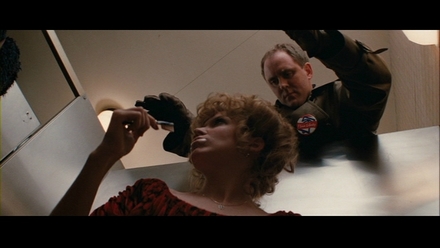
Jon: Hey, thanks for hosting me. This was my first film festival, and will certainly not be my last. On the venue itself, we’re pretty much on the same page, though I’d give butt comfort a higher grade than you might. We both agree that leg comfort was lacking, in that it was bad enough to keep me from sticking around to hear Nancy Allen discuss Blow Out after the credits rolled on that movie. We definitely picked good seats for both showings. On the audience, I was more mixed. While I thought they laughed at mostly appropriate times during Blow Out, the same couldn’t be said for Radical Grace, where deserved laughter occasionally morphed into political choir-preaching. We’re watching a movie, not attending a fundraiser, and the applause at hearing a liberal bromide, whether I agree with the sentiment or not, was a little annoying.
On the movies themselves, let’s start with Radical Grace, Rebecca Parrish’s doc about nuns in conflict with the strictly male hierarchy of the Catholic church. I’m the lapsed (what’s a harsher term?) Catholic after a rigorous upbringing, so it was a film attuned to my inner wavelength. Not coming from that specific religious tradition, how did the movie resonate with you?

My first take was that it is original - it’s about time someone told this story. And it does strike a chord with anyone who believes females and males are equals in the church. If one doesn’t believe that, well shame on them - seriously shame them. However, the political points related to the Affordable Care Act (Obamacare) seemed unnecessary even though that was the big conflict with the bishops, at least that’s what I was lead to believe.
Jon: Documentaries are indeed hard to grade. There’s the cinematic aspect and there’s the journalistic aspect It’s not like I have a separate spreadsheet for ranking Atlantic articles, so that can be difficult. I look at it as, first, does the director have an agenda, and if so, do they communicate it in a thorough fashion? I also like a dash of skepticism and/or doubt. Radical Grace clearly had an agenda, and in my view, it was a worthy one. The poor, homeless, parolees, and other downtrodden are a far more worthy audience for religious institutions to minister to than being judgmental towards single mothers and gay people, and nuns have long been on the front lines. My own great aunts, both nuns, spent their entire lives in Evansville tutoring special-needs kids. That the bishops would come down on outspoken nuns, of all people they could come down on, is obscene.
As far as thoroughness and skepticism, Radical Grace isn’t that kind of movie. Parrish doesn’t entertain the possibility that the nuns may be over-reaching in their broader goals. Is it appropriate for religious figures to aggressively advocate for legislature, right or left? Parrish doesn’t challenge the Nuns on the Bus in any way, despite the presence of a PR manager on the bus who coaches them on questions about Planned Parenthood. It felt incomplete and obsequious, like Parrish was seduced by the nuns’ charisma, a believable proposition but a disappointing one.
The prospect of female priests in the Catholic church also occupies plenty of time, and while this is self-evident from my perspective, the Catholic church is built on millennia of papal bulls and encyclicals. For an organization with a supernatural premise, they’re deeply rooted in logic and debate, and self-evident or not, something like female priests needs a lot of scholarly weight behind it. Archaeological guesses from non-experts aren’t going to do it.
Radical Grace is making an emotional argument, and though I’m intellectually let down, that doesn’t mean that the cinematic aspect didn’t work for me in places. Parrish does get plenty of human moments in her film. Bryan, did Radical Grace work more on your heart than your brain? I can definitely say it did for me.
Bryan: I think it worked on both levels, but it tug at my heart strings more than my synapses. I was emotionally invested in Sister Jean. The prison population in this country is out of control so I love seeing incredible people like Sister Jean doing incredible thing for ex-inmates. Radical Grace, like most documentaries, is easy to pick apart if you really want to. The ACA debate was presented as one sided. The inclusion of the public relations lady lead to more questions, but I’ll give the director credit for actually showing she was there. If the PR aspect had been hidden it would have been less sincere (not sure of word choice here) of a movie.
The scenes in the catacombs were eye opening, and I wish the movie had spent a little more time with some historians rather than the token, “Some historians believe...” line. One my complaints for this movie was that it spread itself too thin. 10-20 more minutes could have gone a long way towards developing the intellectual side of the film.
My last complaint was the strange inclusion of the “bad guy” bishop and the random person on the street ranting almost incoherently. Every documentary seems to do this, but the best pick people out who can argue opposing views with some fluency, rather than typical bad guys spewing lines the audience will obviously disdain.
I feel like I’m now railing against a documentary that told a much needed story. I enjoyed 100% of Sister Jean’s story, 90% of the history, and 50% of the ACA stuff.
If you’ve got more to add, feel free. I’m ready to wrap up my thoughts. I looked in the master spreadsheet for a comparison of documentaries we've both seen. You have a range of grades, while I’ve never given a documentary higher than a B unless we’re going to add 6+ hour Ken Burns epics to the list. I’m stuck between B and B-. Radical Grace was engaging and told a story which needs to be heard like The Overnighters, King of Kong, and March of Penguins, but it’s not as “propaganda-y” as Michael Moore’s documentaries.
Jon: The last thing I’ll say about Radical Grace is that I was surprised by my emotional reaction to it. I think three years into his reign, Pope Francis has changed the tone of the church, and that’s about it, especially in regards to sex abuse. There’s still plenty of enabling bishops that are comfortably retired in the Vatican and around the world, bishops who Francis could boot at any moment, and he chooses not to. That said, watching one of the nuns live reaction to his election floored me. I’m never going back to the church, but that sense of hope she talks about is universal. Catholic or no, the potential that a powerful organization might go back to its roots of punching up against warmongers and greed instead of punching down against people that would like to not have a dozen kids or gay teenagers has a magical quality that transcends stuffy doctrine.
On documentaries, when looking at the breadth of documentaries I've got listed in the spreadsheet, the highest rated ones are not about issues but about people. With Parrish coming from the Steve James Chicago school (who made perhaps the greatest documentary ever made in Hoop Dreams), I certainly think she had that paradigm in her head. If Radical Grace were only about the Chicago sister who ministered to the recently paroled, following her and some of the people she worked with, that’s a recipe for greatness. I think she muddles it with the Nuns on the Bus and the advocacy for female priests, turning the personal into the political. Quibbles be damned, though, because those nuns are all charming. I’m at a B-.
Onto Blow Out, how much of a caveat should we give your opinion on it if you were asleep for some percentage of it?
Bryan: The caveat being that it wasn’t engaging enough to keep me awake in spite of the least comfortable chair I’ve sat in outside of an airplane. Most of this section will be all you as our car ride home was me talking about what I felt were two good scenes - the intro and the exit. The rest being borderline unbelievable garbage. I don’t give points for “well framed” when the scene makes no sense for the story or is senseless.
Jon: I’m not really going to argue for the story of Blow Out, except in the broadest of terms. In reading further about it, the general premise is adapted from an Italian classic called Blow Up. It’s not surprising that multiple movies have used the premise of lone artist gets evidence of a murder plot and has to expose the conspiracy, because that’s an unimpeachable foundation to build your movie on. That foundation begins to crumble in Blow Out with plot details that don’t really add up. The whole train station/parade climax is packed with incredible frames and shots, but I could not banish from my head the absurdity of the whole situation. It’s a problem with an easy solution, and when characters are aggressively stupid, it’s difficult to empathize with them. Director Brian De Palma may have always had his protagonists failing to achieve anything, but there must have been a better, more honest way of getting there.
All the logic holes don’t kill the film for me. I’m not running Cinema Sins or a similarly nitpicky Youtube channel here. Blow Out is an easy film to lose yourself in. De Palma lets scenes breathe and build, making Blow Out feel like a 70’s slow burn thriller despite its 80’s release. I also love any film obsessed with arcane processes. Capturing outdoors noises, splicing tracks together, merging it with video, all these scenes are right in my cinematic pleasure center. I don’t know how to do any of this, but Blow Out walks me through it, showing and not telling. This goes beyond the sound stage into other processes, like how to stalk and murder a person. Lithgow’s assassin is methodical in a way that his every move is interesting to the viewer and well-informed by the character. Couple these sequences with De Palma’s novel way of shooting and framing and tracking, and Blow Out works visually to the point where it gets easier to overlook any nagging plot holes.
Travolta and Lithgow are great, but Nancy Allen is a struggle for me. Her tone of voice and accent makes me think of Mayor Quimby’s girlfriend in the Simpsons, which may as well be based on Allen’s character. It’s not pleasant. The character herself is most generously described as naive. If I’m being uncharitable, she’s too stupid to live. There was never a moment in the film where I wavered in my opinion of her. I was invested in her surviving because of the tension and urgency that De Palma films that sequence, but that’s the most I could say for her: I didn’t want her to die, which is not quite the same as saying I wanted her to live. It’s on the level of Shelley Duvall in The Shining, a mostly passive character not elevated by the actress playing her, which ultimately detracts from the overall film.
I can meet you in the middle and say that were absolutely problems with Blow Out. Can you dig deep for any praise of it? How about that great scream that ends the opening scene? Travolta’s sweaty, agitated performance?
Bryan: First, any movie or TV show which you must read about to truly enjoy is not a good show. That’s not part of the viewing - this isn’t a class in school. I’m with you on this, “Capturing outdoors noises, splicing tracks together, merging it with video, all these scenes are right in my cinematic pleasure center.” though I was raised in the Bible Belt so I’m not sure where my cinematic pleasure center is located.
Towing the line between actively rooting for a do-nothing character to live or die is a strange place to be. She along with most of the rest of the cast were do-nothing characters. They offered little engagement. The beginning and the end of Blow Out were its best scenes to go along with the minutia of film audio engineering. The repeated scream dubbing was enlightening. Most of the middle was literally sleep inducing.
Jon: Clarification: I only reference a movie Blow Out is based on to demonstrate that the roots of this story are sound. The basic premise is a strong one, especially for the early-80’s period of the film, in the wake of Watergate and the Church/Pike hearings that exposed all the dirty dealings of the CIA. On your statement about not needing supplemental materials to enjoy any work of film or TV, I completely agree. One of my favorite TV critics, Alan Sepinwall, says exactly the same thing, and when reviewing Game of Thrones, anytime the show leaves him with insufficient information that the books include, he justifiably interprets that as a knock against the show.
I do want to push back on the ‘do-nothing’ characters. Lithgow’s Burke is a force unleashed into the world by his bosses, and even though he dies, his mission is a complete success (Though I’m fuzzy on the particulars. Were no copies made?). He does a whole lot more than nothing. Travolta’s character is far less effectual but that may have been the point. He’s not the right person to expose a conspiracy like this. He’s stuck in a job he doesn’t care much about, turning out schlock to be viewed at stag parties, and though he’s a good sound man, he’s not a detail-oriented or thorough planner, having already sent a man to his death in his previous life working for the cops. That might be interpreted as a cheat, in which the film can leave details hanging because it’s protagonist has plenty of blind spots, but a more charitable perspective would be to view him as fallible, and therefore more relatable. If I was single-handedly uncovering a conspiracy, I would probably make some mistakes, too.
I am eager to rewatch Blow Out at some point in the future, because it’s certainly possible that I missed clarifying details while I was trying to mentally force-push the discomfort out of my knees. Even if those details are missing, De Palma still does a hell of a directing job. If my root critical rule is Howard Hawkes’ ‘Three great scenes and no bad ones,’ then Blow Out mostly passes. The opening and closing scenes are all-timers, and there’s plenty of other great scenes to leaven my distaste of Allen’s character or my questioning of some inclusions, like Burke’s second prostitute kill in the train station. Those negatives keep Blow Out from receiving my highest grades, but I think this is a B, with the highly likely scenario that this is a movie that I appreciate more on a second viewing. A plot that methodically ticks off A-then-B-then-C is not always a necessity, especially when Blow Out consistently looks as great as it did.
I’ll give you the last word on Blow Out, and Ebertfest in general.
Bryan: You can usually talk me up a few points, but not here. If our dozens of fans are film buffs and love character analyzation, I think they’ll find a place in their hearts for Blow Out. If they’re like me and want entertainment or education Blow Out is a bust. I’m going C-.
I’ll give the 18th Annual Ebertfest a B+.
Pros: Unique movies, Champaign-Urbana, crowd who loves movies, The Virginia Theater
Cons: The Virginia’s seats - these really were awful and as a skeptic - the uniformity of thought in the crowd
I listened to a local podcast following Ebertfest and one person commented on how great this festival is because it’s at one venue. Good point. I’ll definitely be going again. Will you and Shane be flying up again next year?
Jon: Trips from the South back up to the Midwest will have to be judiciously parceled out in the future, but I did have a good time at Ebertfest. I may have to talk a Setnor or two into it. I assume your daughter’s puppet shows will get increasingly sophisticated, so that’s another big reason to return to Champaign-Urbana.

 RSS Feed
RSS Feed